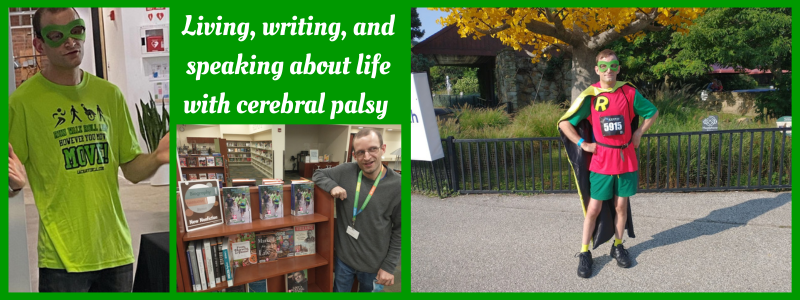Frequently social media gets viewed negatively. No matter if Facebook, Twitter, or another platform, controversy tends to lurk. A joking exchange escalates to high tension. Behavior ranging from simply immature to downright mean, fractures lives. These scenarios craft unpleasant perceptions about social media.
Admittedly, the pessimistic view possesses merit. However, the negativity also risk overshadowing the benefits social media provides. Such positives exist, I promise! I know thanks to my own personal experiences. Plus, conversations I enjoyed with others.
Personally, pre-digital age I felt alone in my heavy dislike for escalators. Through the cerebral palsy Twitter chat #CPChatNow my lonesome quirk transformed into a common bond shared with fellow participants. Now oppose to feeling weird, I feel reassured. When my friends react bewildered to my escalator fear, I internally laugh knowing “#CPChatNow would understand.”
While my example highlights a minor oddity, more serious upsides remain. I am talking significantly uplifting ones! Hence why constantly hearing social media verbally assaulted peeves me. Someone should fight back. So, allow me. To quote the Fantastic Four’s The Thing “It’s clobberin’ time!”
Naysayers criticize: “Social media just gets people in trouble.”
Sound familiar? You could live largely offline and still regularly hear the above. After a star lands amidst trouble via social media, pundits echo the phrase. “Social media just gets people in trouble.”
Wrong! Problems occur due to someone talking without thinking. Social media merely serves as a tool to express oneself. Just like an email, text, or in-person chat. Yet I never see people claim, “Texting just gets people in trouble.”
Alternative to blaming the tool, refocus. Practice the same self-control displayed communicating elsewhere. Avoid responding when angry. Instead walk away. Calm down. Contemplate whether the comment even warrants a response. If indeed a reply remains warranted, thoughtfully compose the message. Then carefully reread prior to posting.
Naysayers also insist: “Social media is filled with bullies.”
Cyberbullying stands a daunting concern. A serious matter holding potentially deadly consequences. Seeking to escape constant harassment, individuals turn to suicide. Tragic!
A shame too. Shameful partially because the tragedies overshadow a huge upside. The right Facebook group, Twitter chat, etcetera becomes a vital pillar towards building a support system. An occurrence I continue witnessing co-hosting the previously mentioned #CPChatNow. No need to absentmindedly believe me though.
One particular #CPChatNow I noted my plans to write this post, asking “How has social media had a positive impact on your life?” Chris, a chat regular, answered in-part “I’m also in Facebook groups for different things, and like Twitter, someone always knows answers to questions. That and just the general understanding you get from others with disabilities… Especially your own. Like with us, you know exactly what a pain clonus is.” Chris continued giving examples. Ultimately, she concluded “Social media has done so much for me. I can’t imagine surviving disabled/chronic illness life without it.”
Unimpressed naysayers claim: “But that’s not real. Get a real life!”
The final criticism I wish to fight back against today tackles a misconception embedded inside our culture. A common acronym embodies the fallacy, IRL. In real life! Using IRL to describe offline interaction simultaneously questions the realness behind online activity.
Do not dismiss a conversation or connection based off where the interaction happens! Rather measure by the resulting impact. A video I recorded alongside tenured #CPChatNow regular Hannah Pike comes to mind. Within Hannah discusses what she deems social media’s positives.
Specifically, Hannah mentions trying new things. Decisions revolving around somebody else’s recommendation online. Only a single product or tip needs to work to leave a real and tangible impression.
Final Arguments
Today I sought to defend social media. Battle the frequent negative perceptions! Hopefully I helped you realize social media does not get people in trouble. Rather speaking without thinking does.
Additionally, I hope I encouraged you to see beyond cyberbullying’s ugly shadow. Lighting the way to show social media also builds support systems. A benefit, critics tend to dismiss as unreal. Ideally, I convinced you to dismiss their dismissal. Just because the connection happens online fails to diminish the realness.
Do you agree? Help me defend social media! Comment below, sharing how social media has had a positive impact on your life.
Until next time, remember. Don’t blend in. Blend out!
-Zachary


